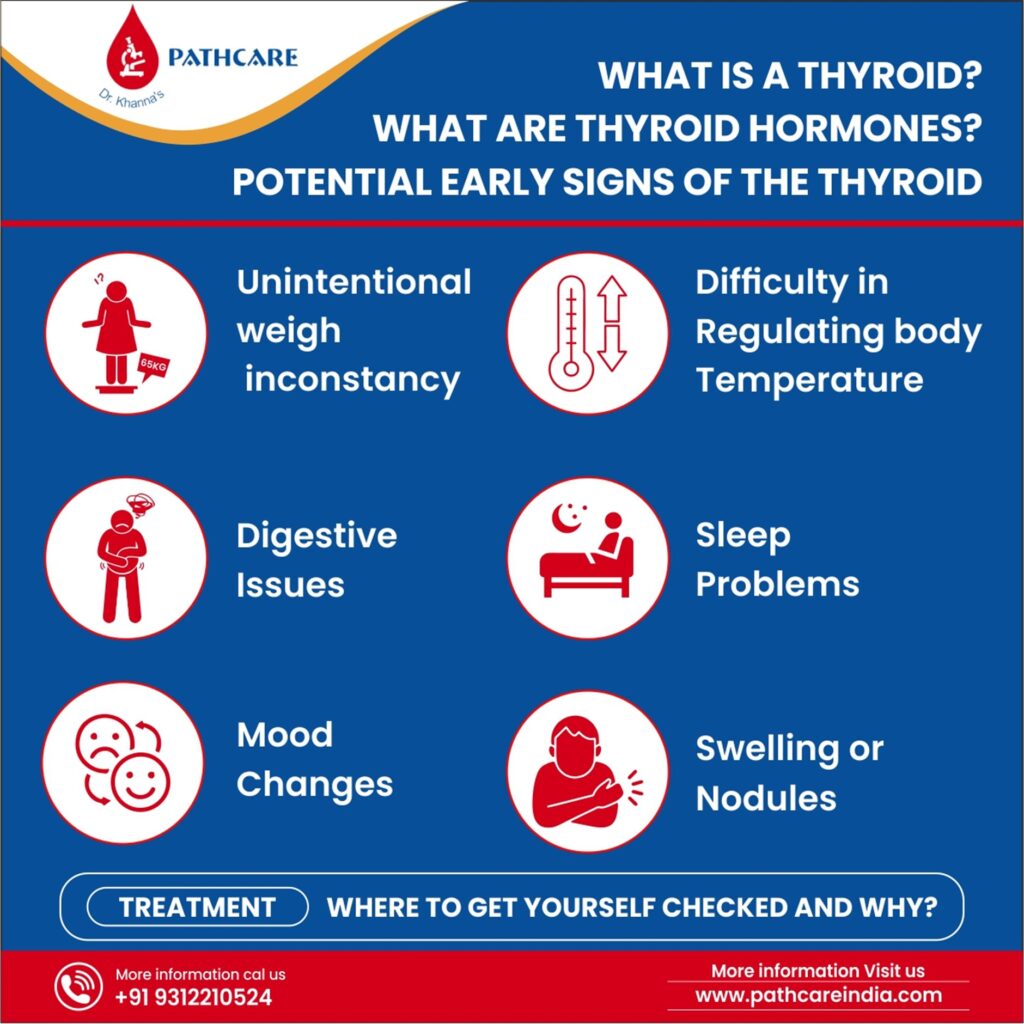No products in the cart.

The drastic changes in the environment and the day-to-day lifestyle have raised the chances of developing thyroid disorders in the population. According to 2104’s workshop study on thyroid disorders in Chennai, year-round, 42 million people suffer from thyroid disorders. The prevalence of diagnosed hyperthyroidism or hypothyroidism was 2.5℅ in males and 0.6 in females and 4.8℅ and 0.2℅ , respectively.
The thyroid is a remarkably significant gland that has a major role in managing health. Any malfunctions caused in the gland can develop severe health problems. The point of concern is that the problems caused by thyroid dysfunction are hard to specify. Studies suggest that one in ten adults is diagnosed with thyroid.
The thyroid symptoms are so common that they can mistakenly be counted for other health diseases. However, getting your thyroid diagnosed with early symptoms will benefit you by getting professional medical assistance to treat it immediately. Pathcareindia considered this issue to give you more understanding of the thyroid.
TABLE OF CONTENT
- What is a thyroid?
- What are thyroid hormones?
- Potential early signs of the thyroid.
- Treatment
- Takeaway
WHAT IS A THYROID?
It is always recommended to get yourself basic awareness about the disease and its origin. To acknowledge the early signs of the thyroid, you must know about the gland thyroid.
The thyroid is a small butterfly-shaped endocrine gland that secretes hormones that regulate the body’s metabolism. The gland covers the trachea in the front of the neck. The metabolism then converts the food into usable vitality. For a proper metabolism rate, the thyroid gland must work correctly.
Apart from being a regulatory hormone of metabolism, the thyroid glands function variably in the body for different parts.
- Thyroid hormones help in brain development,
- It helps in heart control,
- Aids in bone maintenance and regulation,
- Regulating digestive functions.
WHAT ARE THYROID HORMONES?
The thyroid gland secretes two major types of hormones T3 and T4. They are also known as triiodothyronine (T3)and thyroxine (T4). The ideal normal thyroid levels of an individual are a total T4 level in grown-ups varying from 5.0 to 12.0μg/dL, whereas the total T3 level in adults ranges from 80-220 ng/dL.
T3 is considered relatively more active than T4. Only 20%production of the total thyroid hormones consist of T3 rest of the 80℅ production is of the T4 hormone. Yet the enzymes in the liver, kidneys or other tissues convert the thyroxine hormone into triiodothyronine which is more bioactive.
To uphold and preserve good overall health and the health of your thyroid gland, it’s essential to understand the equilibrium of the thyroid hormones and their level. The pituitary gland regulates the broad generation of the thyroid gland. The pituitary gland is found at the bottom of your brain and secretes the hormone(TSH) THYROID STIMULATING HORMONE. In cases where the thyroid hormone level drops, the TSH comes into play by promoting the thyroid gland to generate more thyroid hormones.
The release of thyroid hormone follows a sequence of events that runs normally in a healthy human. The series of processes involves one more gland of the brain, the hypothalamus, which releases a hormone called thyrotropin-releasing hormone, which further stimulates the process of generating thyroid hormone. The human brain can adapt to the changes constantly made by the body and environment and maintains an acceptable level of hormones.
POTENTIAL EARLY SIGNS OF THE THYROID
Any dysfunction in the thyroid gland will lead to the dysfunction of many metabolic and bone regulation processes. There are considerably two main types of thyroid disorders: hypothyroidism and hyperthyroidism.
Hypothyroidism is defined as when the malfunction of the thyroid leads to an improper amount of production of thyroid not fulfilling the body’s requirements is known as hypothyroidism. Whereas overproduction of the thyroid hormone is termed hyperthyroidism.
Detecting the potential early signs of thyroid malfunction is often hard to miss. Here are some common signs you need to know
- Unintentional weight inconstancy
When there is not enough thyroid hormone production in the body, it simultaneously slows down the metabolism, which typically increases the weight of your body, even with the alterations in the diet and exercise schedule. Losing weight will be tough when the person is suffering from hormonal imbalance.
However, in the case of hyperthyroidism, the patient may lose weight unintendedly, although without altering their diet or physical workout.
- Digestive Issues
As of now, you are aware that the thyroid is closely linked with the working of your metabolism. So any changes in the hormonal levels will lead to gastrointestinal problems and affect your body’s digestion, which will often lead to constipation or other related issues.
- Mood Changes
Alterations in the thyroid level will result in mood changes, often with developed issues of depression and anxiety. Severe problems with a decreased thyroid level lead to anxiety symptoms.
Whereas in hypothyroidism, the person might be more prone to symptoms of depression. However, patients with hyperthyroidism will endure nervousness, irritability, and anxiety.
- Difficulty in Regulating body Temperature
The metabolism plays a vital role in the regulation of body temperature. For instance, when the body temperature is quite cold, our body naturally burns more calories to keep our body warm.
Inconstancy in the metabolism of the body will hinder the body’s natural temperature regulation mechanism. When the thyroid in your body is underactive, you are more prone to get cold. The season of Winter may feel intolerable. Alternatively, you may have trouble dealing with hot weather if you have overactive thyroid hormones. Excessive sweat may be released even in delicate climates.
- Sleep Problems
Thyroid hormone imbalance will lead to sleep disturbances. Hypothyroidism leads to obstructive sleep apnea. Sleep apnea is a disturbance in which you stop breathing in your sleep at regular intervals. Obstructive sleep apnea is an aspect of this disorder depicted by bodily obstructions that resist the patient from breathing freely in sleep.
Hypothyroidism can induce obstructive sleep apnea via multiple components, for example, enlargement of the tongue, disruption in the muscles that regulate the airways, or injury to the nerves and muscles involved with breathing.
Hyperthyroidism may result in sleep issues by generating sweats at night.
- Swelling or Nodules
If a person suffers from thyroid problems, they may witness swelling or nodules on the neck where the thyroid is situated. Swelling is generally an indication of thyroiditis or any inflammation in the thyroid. The presence of Nodules or lumps isn’t of major concern, but there might be a very small chance that a portion may be cancerous. For any notable growth or deformation in the neck, the person should get it checked by a doctor shortly, even if it isn’t thyroid associated.
TREATMENT
After getting your thyroid checked and diagnosed by Path Care India, you must consult the doctor and get yourself treated in time to reduce the harmful effects caused by an imbalance of the thyroid hormone.
WHERE TO GET YOURSELF CHECKED AND WHY?
If you notice such patterns of thyroid signs and symptoms, get yourself checked today in Delhi’s best testing labs, PATH CARE INDIA. Path care India not only provides all pathological tests at reasonable rates but also provides complete preventive measures and care.





